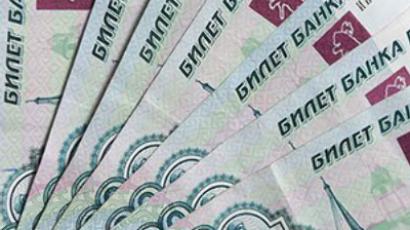Currency wars continue to simmer

With claims by the Brazilian Finance Minister, Guido Mantega, that the currency wars are continuing to rage, Business RT spoke with Manoj Ladwa, Senior Trader at ETX capital, about what is driving currency movements and the implications for Russia.
RT: Emerging markets are facing a dilemma: currency appreciation prevents overheating, but makes domestic products less competitive. What could be a balanced approach?ML: “Well I think the balanced approach is pretty much the approach that especially Brazil is taking at the moment, in that it has made comments to highlight the problems that it is having with the economy. Growth is likely to suffer this year, last year there was around 7 and a half percent, this year we are expecting 4 percent this year. And this is down to a very expensive Real, so they are making tweaks to the system, Brazil is going into the markets and buying dollars in auctions. It is not buying a huge amount, but it is buying enough to reduce its currency or hold back its currency from appreciating further, and it is also increasing taxes on short term investments as well. And this is designed to reduce the flow of hot money coming into Brazil. So tweaking the system seems to be the right approach at the moment." RT: What kind of consensus could emerging and developed economies agree on?ML: “Well it is difficult to see where they will agree at the moment because I feel that we are at the end of quantitative easing in the US, that is one area that will affect emerging markets positively. We won’t see that flow of money moving to the emerging markets in a big way at the moment. So I think the markets are looking to self-correct, I think the finance ministers will look for the markets to correct themselves, and for inflation to start coming back down. For expensive currencies to start shifting back down again and for the dollar to move back up." RT: What if central bankers take a hands-off approach in finding a compromise between emerging and developed economies?ML: “Well I think that is probably the best approach for them to take at the moment, although we are hearing increased rumblings of a currency war. I don’t think they will get down that route, I don’t think they will get that far. And I think it is probably ideal for central bankers to take a slightly more hands off approach and let the markets correct themselves – for commodity prices to come back down, inflation to be reined back in, for growth to start to increase, and therefor they can start increasing interest rates. Let’s not forget that the markets have moved quite sharply in one direction, and they need to come back down in the other direction. And they will do at some point." RT: How does Russia stand compared to the problems other developing nations are suffering?ML: “Well Russia seems to be in a slightly better position than some of the other developing nations. Let’s not forget that these emerging economies have been emerging economies only in the last few years or so, and Russia has been around a lot longer. So Russia has a huge trade balance. Inflation is not really a major issue in Russia and it does have a more developed economy there. So if there is a currency war between developed economies and emerging market economies, I don’t think Russia will be dragged into it as soon as some anticipate.” RT: What could be the contribution of Christine Lagarde, the new head of the International Monetary Fund?ML: “Well I fell that Christine Lagarde’s position as the head of the IMF is to preserve the status quo, certainly for the time being. And let’s not forget that the ECB has started to increase interest rates. There is a meeting tomorrow and they could be increasing interest rates by another 25 basis points – to 1.5% – and this goes some way to reducing inflation, certainly for emerging market economies, so I don’t think Christine Lagarde will make any major moves in the short term. But that doesn’t rule out the ECB making moves to curb inflation and to resolve any issues.”













